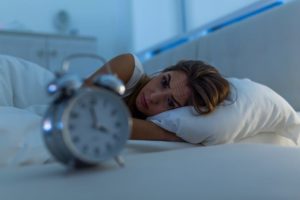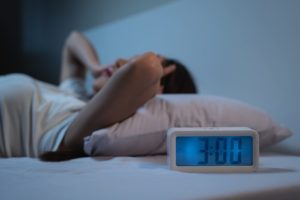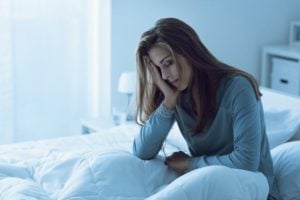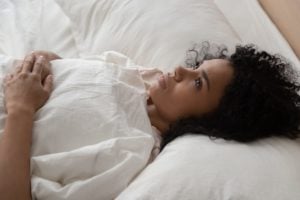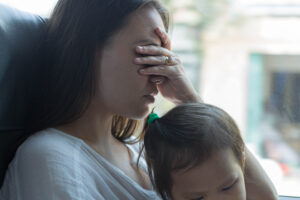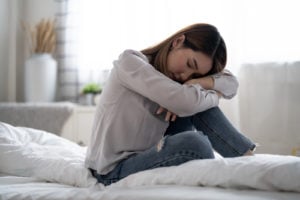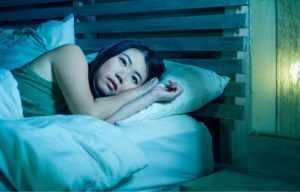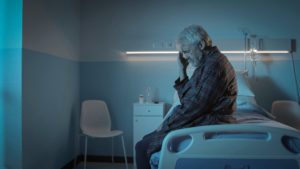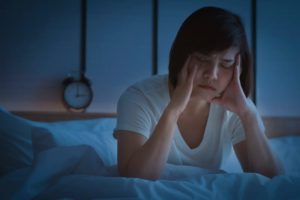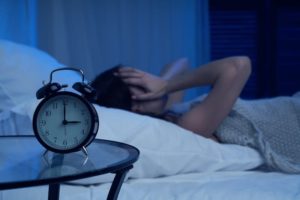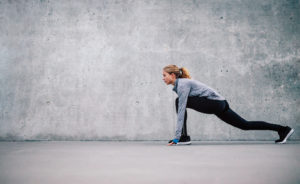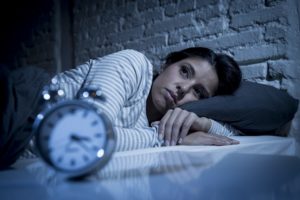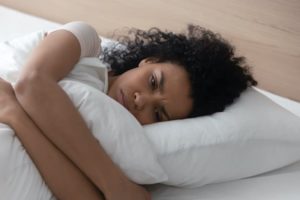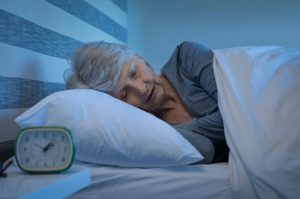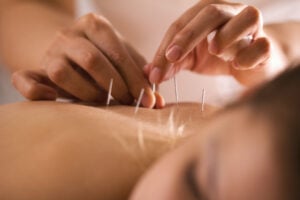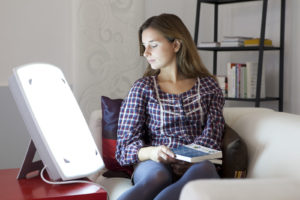Is Insomnia Genetic?
Insomnia, which describes chronic difficulty falling or staying asleep, is a frustrating disorder that impacts overall daytime functioning and quality of life. About 30% to 35% of people experience insomnia symptoms occasionally, and women are more likely to be affected than men.
A growing body of research suggests your genes may also play a role in whether or not you experience insomnia. We explore the latest genetic research on insomnia, and share tips for better sleep.
Is Insomnia Genetic?
Research suggests you can be genetically predisposed to having insomnia. You aren’t destined to experience insomnia because of your genes, however. Rather, certain genes may increase your risk . Other genes can also make a person less likely to experience insomnia. Specifically, researchers estimate that heritability accounts for 31% to 58% of your likelihood of experiencing insomnia.
It isn’t terribly surprising that insomnia has a genetic component. Your genes affect other aspects of sleep, too, such as how much sleep you need. Genes also influence your chronotype , or whether you’re an early bird or a night owl.
Genetic Testing for Insomnia
At this time, genetic testing of sleep traits primarily occurs in research studies. Generally, doctors and sleep specialists do not conduct genetic testing for insomnia in a clinical setting. Instead, they diagnose their patients with insomnia according to a set of specific criteria outlined in the International Classification of Sleep Disorders. People interested in genetic testing related to sleep can participate in a research study or pursue it through consumer companies that offer DNA testing.
Researchers began by identifying genetic markers of insomnia in fruit flies. Since then, they’ve found a large number of genetic markers in humans as well. Studies of insomnia in families, twins, and large genome-wide association studies (GWAS) have found multiple genes that are connected to insomnia. A genome is an individual’s unique combination of genes, and GWAS look at the genomes of large groups of people.
The genes that may cause insomnia are tied to the same processes that regulate your sleep-wake cycle, and whether you feel awake and alert, or sleepy and relaxed. These genes may affect hormones and neurotransmitters involved in your circadian rhythm, such as serotonin, adenosine, GABA, and hypocretin/orexin.
Genes vs. Gene Expression
To understand how your genes affect your likelihood of insomnia, it’s helpful to know the difference between your genes and gene expression. Genes are located in chromosomes, which are found in the nucleus of nearly every cell in the body. Each person has over 20,000 genes, which help define the traits that make you who you are. Genes are made up of DNA, which gives your body instructions to make proteins and dictates what those proteins should do to help you function.
Your gene expression , on the other hand, determines whether or not each set of instructions is carried out. For example, in healthy sleep, the arousal system is inhibited via gene expression, allowing you to relax into sleep. In people who have a genetic risk of insomnia, however, the genes involved in this process may not be expressed. They may fail to send a message to the right neurons. As a result, the arousal system stays in overdrive, and your brain may not calm down as needed to initiate sleep.
You can think of the genetic risk of insomnia as being similar to that of diabetes (which, incidentally, may also be genetically linked to insomnia). People with a family history of diabetes need to be more careful about their diet, sugar intake, and other variables that may increase their risk of diabetes. Similarly, people with a family history of insomnia may need to be more careful about practicing good sleep hygiene and taking preventative measures to prevent insomnia.

Additional Genetic Associations With Insomnia
Large genome-wide association studies (GWAS) have documented between 57 to 248 genetic associations with insomnia, including those related to sleep quality, duration, and timing. GWAS analyze the genetic makeup of tens of thousands of people and help researchers estimate how much an individual’s genes influence a particular trait.
Additionally, they’ve found:
- For some time, researchers have known that women are more likely to experience insomnia than men. Now, they know their genes may be partly to blame, as studies of twins have shown that women have a higher heritability of insomnia than men.
- Many conditions associated with insomnia may also be influenced by the same genes that predispose a person to insomnia, including depression, attention-deficit hyperactivity disorder (ADHD) (9), restless leg syndrome , diabetes, and cardiovascular disease .
- Stress and insomnia are inextricably linked, with insomnia being considered a hyperarousal disorder. Physical and emotional stress can rev up your body and make it difficult to relax into sleep. People with genetic markers of insomnia may be more vulnerable to the effects of stress.
Are Your Genes the Cause of Your Insomnia?
Only genetic testing can determine if you’re predisposed to insomnia. Most clinical doctors do not do genetic testing for sleep issues, but it is available through some consumer DNA companies.
However, an easier, albeit less scientific, route might be to ask your family members if they have trouble sleeping, or if they know of other family members who have insomnia. While you’re at it, ask them for tips and tricks on improving sleep. Since you’re related, what works for them may also be helpful for you.
Tips for Better Sleep
If insomnia is keeping you up at night, try these strategies for better sleep.
Create a Calming Bedtime Routine
Many people who experience insomnia are hyper-aroused, which means their emotions, nervous systems, or other physiological systems are overactive. By following a calming bedtime routine , you can both cue your brain that it’s time to sleep as well as relax your body and mind to prepare for bed. Incorporate calming activities like taking a bath, meditating, stretching, reading, journaling, or coloring.
Transform Your Bedroom Environment
Your bedroom can help you get in the mood for sleep. Make it calm and serene, and as dark, cool, and quiet as possible. You might repaint the walls a calming color. Remove clutter and any reminder of stress, like your work laptop.
Avoid Sleep-Disturbing Behaviors
Caffeine , alcohol , and tobacco all interfere with sleep quality, including your ability to fall or stay asleep. Minimize your intake of these substances, especially in the afternoon and evening. Studies show caffeine can disrupt sleep even when consumed six hours before going to bed.
Similarly, using electronic devices in the hours before bed can keep you up at night and lead to symptoms of sleep deprivation over time. Switch off your phone, TV, and computer an hour or two before bedtime, and turn on your smartphone’s blue light blocking filter in the evening hours to give your eyes a rest.
Get Exercise and Sunshine
A regular exercise routine can positively impact your sleep. By physically tiring out your body, it may be easier to fall asleep at night. If you can, perform your exercise outside, early in the morning or day. The morning sunlight can also positively impact your sleep and mood, by affecting your circadian rhythm.
Ask Your Doctor About Sleep Medications
Medications may help relieve insomnia and related conditions by inhibiting arousal. Some sleep aids can have serious side effects, so it is always important to consult your doctor before using one.
Try Cognitive Behavioral Therapy for Insomnia (CBT-I)
Cognitive behavioral therapy for insomnia (CBT-I) is considered the most effective treatment for insomnia. Over a course of several sessions, a therapist works with you to help you understand the thoughts and behaviors you have about sleep. Then, you learn to replace the unhealthy thoughts and behaviors with healthier ones using various techniques, such as:
- Reframing the bed as a place for sleep. This may include making your bedroom environment more comfortable, refraining from using the bed for any other activity besides sleep and sex, and leaving the bedroom if you can’t fall asleep within a short period of time.
- Following a regular sleep-wake cycle. Specifically, people learn to set a consistent bedtime and wake time, and follow those every day of the week.
- Identifying negative, stressful, or maladaptive thoughts that contribute to your insomnia. Once identified, you learn techniques to interrupt or “talk back” to those thoughts with healthier beliefs.
- Practicing good sleep hygiene. Sleep hygiene includes behaviors that promote healthy sleep. A person with a genetic predisposition toward insomnia may want to be more diligent about following these practices.
Whether you are genetically predisposed to insomnia or not, you have the power to take action and improve your sleep. If your insomnia is not going away over time or your sleep troubles interfere with your quality of life, talk to your doctor. Your doctor can identify any underlying issues and suggest potential treatments.

Still have questions? Ask our community!
Join our Sleep Care Community — a trusted hub of sleep health professionals, product specialists, and people just like you. Whether you need expert sleep advice for your insomnia or you’re searching for the perfect mattress, we’ve got you covered. Get personalized guidance from the experts who know sleep best.
References
15 Sources
-
Gehrman, P. R., Pfeiffenberger, C., & Byrne, E. (2013). The role of genes in the insomnia phenotype. Sleep Medicine Clinics, 8(3), 323–331.
https://pubmed.ncbi.nlm.nih.gov/24072990/ -
Jones, S. E., van Hees, V. T., Mazzotti, D. R., Marques-Vidal, P., Sabia, S., van der Spek, A., Dashti, H. S., Engmann, J., Kocevska, D., Tyrrell, J., Beaumont, R. N., Hillsdon, M., Ruth, K. S., Tuke, M. A., Yaghootkar, H., Sharp, S. A., Ji, Y., Harrison, J. W., Freathy, R. M., … Wood, A. R. (2019). Genetic studies of accelerometer-based sleep measures yield new insights into human sleep behaviour. Nature Communications, 10(1), 1585.
https://pubmed.ncbi.nlm.nih.gov/30952852/ -
Finegold, D. N. (2021, July). Genes and chromosomes. Merck Manual Consumer Version., Retrieved September 28, 2021, from
https://www.merckmanuals.com/home/fundamentals/genetics/genes-and-chromosomes -
Finegold, D. N. (2021, July). Factors affecting gene expression. Merck Manual Professional Version., Retrieved September 28, 2021, from
https://www.merckmanuals.com/professional/special-subjects/general-principles-of-medical-genetics/factors-affecting-gene-expression -
Stein, M. B., McCarthy, M. J., Chen, C. Y., Jain, S., Gelernter, J., He, F., Heeringa, S. G., Kessler, R. C., Nock, M. K., Ripke, S., Sun, X., Wynn, G. H., Smoller, J. W., & Ursano, R. J. (2018). Genome-wide analysis of insomnia disorder. Molecular Psychiatry, 23(11), 2238–2250.
https://pubmed.ncbi.nlm.nih.gov/29520036/ -
Byrne, E. M. (2019). The relationship between insomnia and complex diseases-insights from genetic data. Genome Medicine, 11(1), 57.
https://pubmed.ncbi.nlm.nih.gov/31466529/ -
Lane, J. M., Jones, S. E., Dashti, H. S., Wood, A. R., Aragam, K. G., van Hees, V. T., Strand, L. B., Winsvold, B. S., Wang, H., Bowden, J., Song, Y., Patel, K., Anderson, S. G., Beaumont, R. N., Bechtold, D. A., Cade, B. E., Haas, M., Kathiresan, S., Little, M. A., … Saxena, R. (2019). Biological and clinical insights from genetics of insomnia symptoms. Nature Genetics, 51(3), 387–393.
https://pubmed.ncbi.nlm.nih.gov/30804566/ -
Jansen, P. R., Watanabe, K., Stringer, S., Skene, N., Bryois, J., Hammerschlag, A. R., de Leeuw, C. A., Benjamins, J. S., Muñoz-Manchado, A. B., Nagel, M., Savage, J. E., Tiemeier, H., White, T., 23andMe Research Team, Tung, J. Y., Hinds, D. A., Vacic, V., Wang, X., Sullivan, P. F., … Posthuma, D. (2019). Genome-wide analysis of insomnia in 1,331,010 individuals identifies new risk loci and functional pathways. Nature Genetics, 51(3), 394–403.
https://pubmed.ncbi.nlm.nih.gov/30804565/ -
Hershner, S., & Shaikh, I. (2020, August). Healthy sleep habits. AASM Sleep Education.
https://sleepeducation.org/healthy-sleep/healthy-sleep-habits/ -
Drake, C., Roehrs, T., Shambroom, J., & Roth, T. (2013). Caffeine effects on sleep taken 0, 3, or 6 hours before going to bed. Journal of Clinical Sleep Medicine, 9(11), 1195–1200.
https://pubmed.ncbi.nlm.nih.gov/24235903/ -
Stein, M. D., & Friedmann, P. D. (2006). Disturbed sleep and its relationship to alcohol use. Substance Abuse, 26(1), 1–13.
https://pubmed.ncbi.nlm.nih.gov/16492658/ -
Liao, Y., Xie, L., Chen, X., Kelly, B. C., Qi, C., Pan, C., Yang, M., Hao, W., Liu, T., & Tang, J. (2019). Sleep quality in cigarette smokers and nonsmokers: findings from the general population in central China. BMC Public Health, 19(1), 808.
https://pubmed.ncbi.nlm.nih.gov/31234809/ -
Shechter, A., Kim, E. W., St-Onge, M. P., & Westwood, A. J. (2018). Blocking nocturnal blue light for insomnia: A randomized controlled trial. Journal of Psychiatric Research, 96, 196–202.
https://pubmed.ncbi.nlm.nih.gov/29101797/ -
Dolezal, B. A., Neufeld, E. V., Boland, D. M., Martin, J. L., & Cooper, C. B. (2017). Interrelationship between sleep and exercise: A systematic review. Advances in Preventive Medicine, 2017, 1364387.
https://pubmed.ncbi.nlm.nih.gov/28458924/ -
Blume, C., Garbazza, C., & Spitschan, M. (2019). Effects of light on human circadian rhythms, sleep and mood. Somnology: Sleep Research and Sleep Medicine, 23(3), 147–156.
https://pubmed.ncbi.nlm.nih.gov/31534436/



